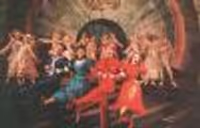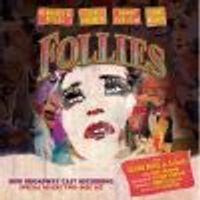The big ol' original musical debate
#50The big ol' original musical debate
Posted: 2/4/12 at 8:37pm
Can we go back to RAGS for a moment? The notion that Joseph Stein BEGAN the work as a sequel to FIDDLER seems to me to have no bearing on the originality quotient of the final work. Anyone listing the characters in FIDDLER would pass through Tevye, Golde, Yente, Tzeitel, Hodel, Chava, Shprintze, Bielke, Lazar Wolf, all the other suitors, Fruma Sarah, Grandma Tzeitel and the Rabbi LONG before they ever get around to mentioning Avram, am I right? And frankly what characteristics of the Fiddler Avram have even been carried over into the RAGS character beyond matching his name? Moving to America? That also covers at least 6 or 7 other characters in Fiddler. Do Nathan, Rebecca, Saul or Bella even know another soul from Anatevka?
I'm sorry; seems to me the only overlap between the two works is a slight laziness on the part of Stein when it comes to naming his dramatis personae. Whatever Stein's original intention, I put the finished show RAGS squarely in the original column.
Gaveston2
Broadway Legend Joined: 6/28/11
#51The big ol' original musical debate
Posted: 2/4/12 at 8:51pm
Please describe the magical process by which Weidman "adapted" something we have no evidence he ever saw. We know from Sondheim's notes that Weidman wrote the book to ASSASSINS apart from the composer-lyricist. Certainly, they had discussed aspects of what the show would cover, but I've seen nothing that indicates Weidman had Gilbert's play as a model.
BTW, by your definition, the TV series, DHARMA AND GREG, and all such shows about lovers from mismatched families are "adaptations" of ROMEO AND JULIET.
#52The big ol' original musical debate
Posted: 2/4/12 at 8:59pm
I've got a few more bona fide originals to add to Henrik's brilliant list:
Of Broadway shows I've seen:
Goodtime Charley
Rex
Ain't Misbehavin'
The Prince of Grand Street
Barnum
My One and Only
The Rink
Chess
Legs Diamond
City of Angels
Merlin
The Magic Show
Baby
Song and Dance
The Will Rogers Follies
The Life
Bring in Da Noise...
Putting It Together
Fosse
Jerry Springer: the Opera
The Boy from Oz
Curtains
The Glorious Ones
Bloody Bloody Andrew Jackson
If I'm in error on any of these, I'm sure you guys will point it out. :)
Updated On: 2/4/12 at 08:59 PM
Phyllis Rogers Stone
Broadway Legend Joined: 9/16/07
#53The big ol' original musical debate
Posted: 2/4/12 at 9:02pmI'm sure bobbyfrank will be posting any time now to tell you why you're wrong!
#54The big ol' original musical debate
Posted: 2/4/12 at 9:05pmJERRY SPRINGER: THE OPERA is based on the television series.
#55The big ol' original musical debate
Posted: 2/4/12 at 9:13pm^Have you seen it? That's like saying Book of Mormon is based on the actual Book of Mormon. You must admit there is no previous scripted Book, Play or Movie from which the musical's script is adapted. Basing it on the real character of Jerry Springer seems to me no less original than basing Bloody, Bloody... on the real Andrew Jackson.
Gaveston2
Broadway Legend Joined: 6/28/11
#57The big ol' original musical debate
Posted: 2/4/12 at 9:53pm
I agree with Charles on the issue of musicals based on historical figures.
By the same token, CALL ME MADAM is an original musical, even though it was based on the "idea" of real life hostess and ambassador, Pearl Mesta.
Whenever a musical has been based on an historical person, we may assume the writers consulted one or more biographies of their subject. That's not the same as saying they "adapted" said research materials--except in the few cases where the entire show is based on one source. For this reason, GYPSY is an adaptation and is credited as such, despite the liberties taken with the source material.
I realize that official credits can be corrupted for the right price, but without very specific evidence to the contrary, I think we have to classify something as an adaptation or not based on them. Credits such as "adapted from" or "based on" an alternative work indicate adaptations. "Based on" or "inspired by" an "idea" do not.
Otherwise, EVERY musical has been adapted, at least since THE BLACK CROOK. For they all borrow elements from previous musicals, such as a dancing chorus, lovers who are foiled until the denouement, comic supporting characters, eleven o'clock numbers, etc.
bobbybaby85
Featured Actor Joined: 8/3/11
bobbybaby85
Featured Actor Joined: 8/3/11
Gaveston2
Broadway Legend Joined: 6/28/11
#60The big ol' original musical debate
Posted: 2/5/12 at 3:43pm
And I agree with bobby that adaptation as the primary source for musicals has been the norm since at least OKLAHOMA! There's no reason to complain about it now as if it were a new trend.
What has changed are the economics of Broadway and the reliance of producers, et al., on "pre-sold" titles instead of choosing projects because they arise from a genuine and original creative impulse (whether that impulse is to adapt or invent a new plot). But even this isn't entirely new: I'm sure Ziegfeld knew many ticket buyers would be interested in an adaptation of Edna Ferber's best seller, SHOW BOAT. It's just that shows have gotten so expensive, the temptation to rely on known properties is even greater.
#61The big ol' original musical debate
Posted: 2/5/12 at 7:23pmHardly new even when Ziegfeld, Kern and Hammerstein turned to Ferber Gaveston. Nor was it new when Mozart turned to Beaumarchais, let alone when Verdi turned three times to Shakespeare and four times to Schiller.
Gaveston2
Broadway Legend Joined: 6/28/11
#62The big ol' original musical debate
Posted: 2/6/12 at 2:54pm
henrik, I know adaptation isn't new: the ancient Greeks adapted their historical accounts (what we call myths) to create their tragedies. Almost all pre-contemporary Southeast Asian theater is adapted from the Bhagavad Gita, noh from the Tales of Heike, etc.
I was talking about the trend toward picking source material primarily for name-recognition value. Do we have evidence that Mozart turned to Beaumarchais for a "pre-sold" title? I know BUTTERFLY had been a hit Broadway play, but did Puccini choose it BECAUSE it had been a hit in another medium (and would therefore attract an audience) or just because the subject matter appealed to him?
Updated On: 2/8/12 at 02:54 PM
#63The big ol' original musical debate
Posted: 2/6/12 at 4:33pm
Let's not forget that a writer/composer/lyricist can be passionate about a particular past work that happened to also be successful, but its past success does not necessarily have to be the reason it was selected. It might be that it works as a correlation, not a causation - namely, if the original work was more popular, then more people would have originally seen it, thereby increasing the likelihood that someone who sees it will feel passionately about it and will want to adapt it into a musical in the future. That just seems logical to me and doesn't necessarily mean that people are sitting around thinking to themselves - 'what can we adapt that is already famous and will sell tickets?'. Maybe some creative types do ask that question, but i would imagine that at least some choose to adapt a specific popular work that they happen to be passionate about, but they would not necessarily want to adapt another similarly-popular work about which they don't feel particularly passionate.
#64The big ol' original musical debate
Posted: 2/6/12 at 4:44pm
Ain't Misbehavin' is a revue without a story or book.
I would say the same about Song and Dance; there's only the slightest of stories and no real book to speak of.
Bring in Da Noise... is a revue without a book.
Putting It Together and The Boy from Oz may have books, but they don't have original scores, so I don't think you can call either an "original" musical.
Gaveston2
Broadway Legend Joined: 6/28/11
#65The big ol' original musical debate
Posted: 2/6/12 at 10:38pm
Let's not forget that a writer/composer/lyricist can be passionate about a particular past work that happened to also be successful....
Absolutely, adam, it isn't either/or. In fact, some of the most mediocre musicals result not because the adapters chose the source material cynically, but because they were so in love with it they never really considered how their musical version would be different.
The result is what Sondheim calls a "why?" project. Frankly, I felt that way about SUNSET BOULEVARD, SINGING IN THE RAIN and GONE WITH THE WIND, to take but three examples. I won't pretend to see into the hearts and minds of the musical adapters, but what they produced was like a paint-by-number copy of a great painting: ultimately pointless, in my view, even though each copy has aspects that are appealing.
(I realize that others may disagree with my examples here.)
Perhaps the real question is whether better musicals have been adapted from wildly successful sources or from moderately successful and/or flop sources. I'll leave such a list to someone like henrikegerman whose memory is better than mine, but I think it's at least possible that the best musicals have been made from the less successful sources. Not so much baggage.
#66The big ol' original musical debate
Posted: 2/7/12 at 1:40pm
Thanks CG, and although I didn't mean my list to be exhaustive I can't believe I forgot City of Angels and Will Rogers which should have gone on my tony best musicals with original librettos sublist, especially since I'm a big fan of both of those shows, especially City of Angels.
And Gaveston, of course I didn't mean to imply that you weren't well familiar with the long history of adaptation; sorry if it came off that way.
Gaveston2
Broadway Legend Joined: 6/28/11
#67The big ol' original musical debate
Posted: 2/7/12 at 5:03pm
No problem and no offense taken, my dear friend henrik!
Perhaps the truth is that there are so many fewer new shows each season that the adaptations of blockbuster movies stand out more, not that the practice is at all new.
#68The big ol' original musical debate
Posted: 2/8/12 at 12:22amwoah, woah, woah. Song & Dance has a story! Whachu talkin bout Newintown?!
#69The big ol' original musical debate
Posted: 2/8/12 at 12:37amI believe there's something in Ecclesiastes about this whole thing.
#70The big ol' original musical debate
Posted: 2/8/12 at 10:42am
"woah, woah, woah. Song & Dance has a story! Whachu talkin bout Newintown?!"
I said it had only the slightest of stories; I didn't say it had no story. And it has no book (dialogue), only songs and dances.
#71The big ol' original musical debate
Posted: 2/8/12 at 11:38amBut Song (aka Tell Me On a Sunday) has a very clear book. Dialogue, no. But it has as much of a book as that Best Book Tony winner Falsettos. Dance...well...I'm with ya there.
#72The big ol' original musical debate
Posted: 2/8/12 at 12:34pmI think we'll just need to disagree there - the story to Falsettos is (I believe) much more complex and interesting than Tell Me On A Sunday, which is just a rudimentary "Girl finds love" cliché. The lyrics are so generic and banal, there's no real character or story development.
#73The big ol' original musical debate
Posted: 2/8/12 at 12:46pmWell...but...now you're arguing quality. Which I'm not necessarily going to argue with you (though I do like some of the songs). It does have a very clear (if rudimentary) through line. You can plot it from A to Z, which is really all that's necessary to claim something has a book. I mean...In My Life had a book. It was INSANE. But it had one...as does Tell Me On a Sunday.
#74The big ol' original musical debate
Posted: 2/8/12 at 12:52pm
I think that we need to define the difference between "book" and "story." Sunday has a story, but no book. But its story is the same genre as that of Winterreise, Dichterliebe, or other song cycles. The songs in Sunday aren't particularly theatrical (they aren't very specific as to character or story) in the way the songs (and sporadic dialogue) in Falsettos are.
I agree that it's a subtle thing and difficult to come to any agreement on, but I just can't say that I think Tell Me On A Sunday has a book or even much of a story in a way that a musical (as opposed to a song cycle or revue) does.
Updated On: 2/8/12 at 12:52 PM
Videos








